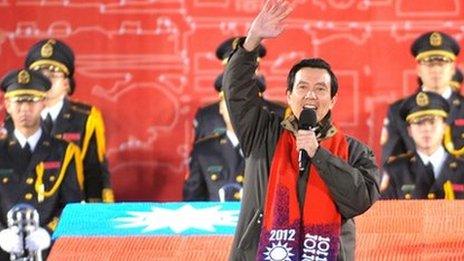Taiwan election: Future of Chinese relations at stake
- Published
Politicians give away freebies, including campaign-branded backscratchers, to attract voters
Firecrackers explode on the streets, drummers bang away atop campaign vehicles, and smiling candidates wave at constituents from roaming caravans.
That's just city councillors campaigning. Those running for mayor hold concert-style rallies and New Year parade-scale marches attended by tens of thousands.
Lively and spirited, this is election season in Taiwan.
Weeks of election fever on the island will culminate on Saturday in the biggest ever local races Taiwan will hold.
More than 18 million voters will choose the heads of nine levels of government, from city mayors, county magistrates and councillors, to township, district and neighbourhood chiefs.
Almost 20,000 candidates are running for more than 11,000 positions.
Unable to say no?
Underneath the festive atmosphere and even though these are local elections, there is a lot at stake, especially on Taiwan's relations with its long-time rival, mainland China.
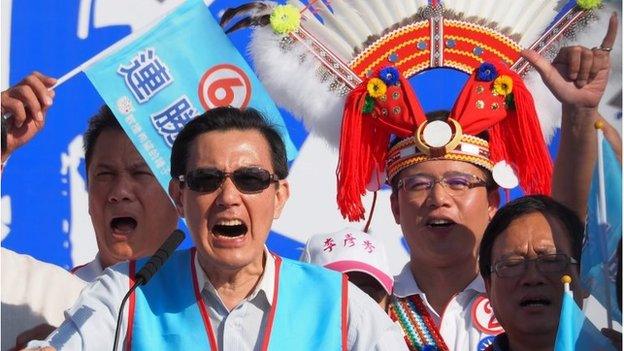
Not everyone backs President Ma Ying-jeou's building of closer ties with Beijing
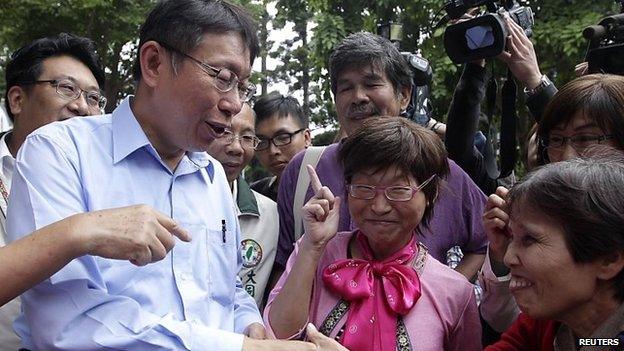
Independent candidate Ko Wen-je (left) is ahead of pro-Beijing candidate Sean Lien in opinion polls
Candidates from the governing Kuomintang (KMT) party are battling to maintain its majority control of Taiwan's six biggest municipalities, where two-thirds of the population lives.
Although it already holds the presidency, a legislative majority, and most of Taiwan's cities and counties, the KMT risks losing even its traditional strongholds, such as Taipei and Taichung, in this election. Opinion polls have shown its candidates are trailing those backed by the opposition Democratic Progressive Party (DPP) in some key areas.
The governing party's rapid pace of developing economic and trade ties with China in recent years has left many worried that Taiwan will be unable to say no to Beijing on unification one day. China wants to eventually take back the island ruled separately since the end of the Chinese civil war in 1949.
Some voters fear China will have too much influence over the Taiwan if the KMT remains in power and continues down the path of building closer ties with Beijing.
"I do have worries that Sean Lien [the KMT's Taipei mayoral candidate] will have too many links with China," said Taipei resident Joseph Wu.
"We know Sean Lien is closer to China. [His rival] Ko Wen-je, on the other hand, will work harder for this side."
'No real benefits'
Also fuelling dissatisfaction with the KMT is a recent spate of food scandals, stagnant wages, and the increasing gap between the rich and poor.
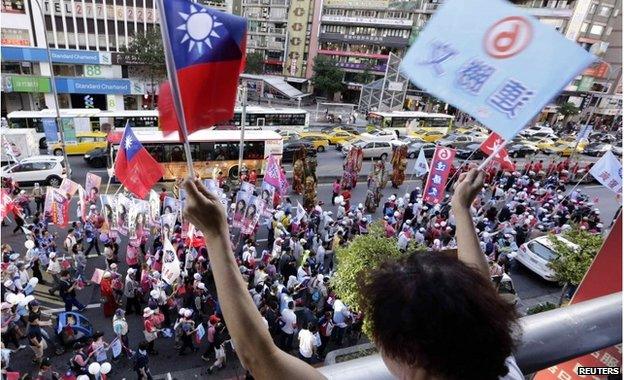
Supporters of KMT candidate Sean Lien say stronger relations with Beijing will benefit Taiwanese people
That's despite its opening policies which have brought some two million Chinese tourists here each year, as well as Chinese market opening for Taiwanese companies, and tariff cuts on Taiwanese products exported to the mainland.
"The local elections this time have a strong uniqueness - they are very anti-incumbent," said Yu Ching-hsin, a research fellow at National Chengchi University's Election Study Center.
"President Ma Ying-jeou has been in government for six to seven years, but despite so much economic interaction with China, they do not translate into real benefits for ordinary people.
"That's because the benefits have been given to companies mostly."
For its part, the KMT has argued the DPP shoulders blame because it is blocking the approval of economic deals with Taiwan's biggest trade partner China, which would create jobs and generate investments here.
Many KMT supporters, meanwhile, fear the implications of a victory by the DPP, which favours Taiwan's formal independence from China. They believe it could hurt the good relations the KMT has worked hard to build with Beijing.
"It will greatly affect Taiwan and mainland China's economic and trade relations and harmony. This will not only cause cross-strait relations to regress, it will cause Taiwan's economy to regress," said Taipei retiree Chang Chih-shen.
Future advantage
These may be local elections, but they have wider implications.
Taiwan is still a young democracy. It only began allowing truly democratic elections, with opposition party candidates and universal suffrage, in the late 1980s.
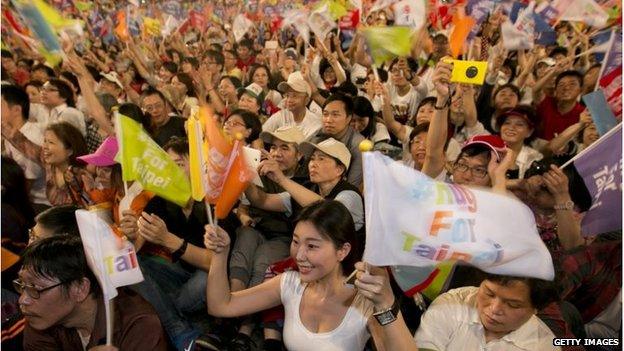
For political parties, having one of its people head a city, county, township, village or even neighbourhood can help it build strong relations with constituents, by managing well its jurisdiction, or influencing their views through pork barrel politics.
At the same time, local politicians can influence central government policy toward China, and voters' views on Beijing ties.
Whichever party does better in these elections could also give it an advantage in the more important presidential and legislative races in 2016.
If the KMT suffers big losses, it could face an uphill battle in 2016 and even lose the presidency. That could change the course for Taiwan-China relations.
The party may have to slow the pace of developing ties with Beijing and re-evaluate how to make its China policy more responsive to the needs of Taiwanese people.
If the opposition wins big, China may have no choice but to find ways to work with a party it has long disliked.
"Beijing will have to think about the possibility that the DPP may win the presidential race in 2016; it will have to think about what it can do in the meantime to prepare for that, and whether it should boost contacts with the DPP," said Mr Yu.
With so much at stake, these races are not only watched closely in Taiwan, but in mainland China as well.
- Published15 January 2024
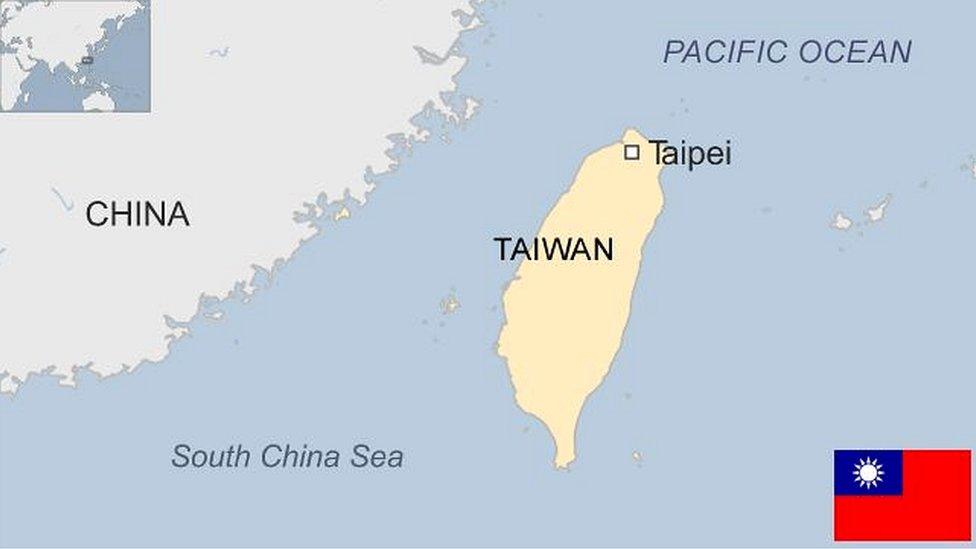
- Published25 November 2014

- Published30 September 2014
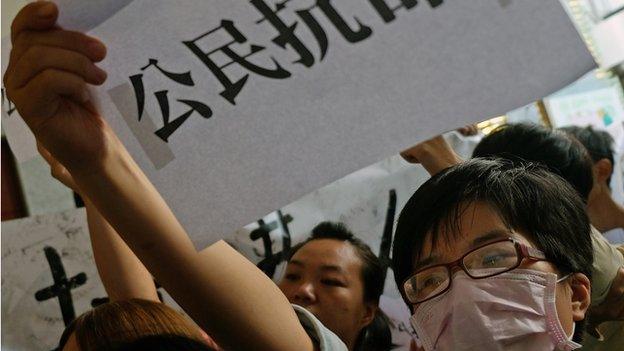
- Published14 January 2012
- Published14 January 2012
